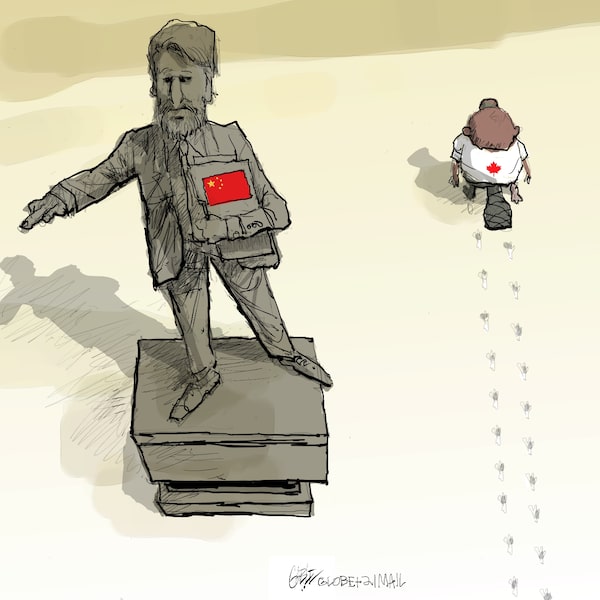Good morning,
Seven of the largest law firms in the country have signalled that they are willing to share gender wage-gap data for research purposes, similar to what firms in the United States and Britain have been doing for years.
Borden Ladner Gervais, Norton Rose Fulbright, Stikeman Elliott, Aird & Berlis, Dentons, Stewart McKelvey and MLT Aikins – representing more than 3,100 lawyers – all left the door open to the possibility, in response to recent questions from The Globe and Mail.
“We want to help identify the problem and be part of the solution,” said Lydia Bugden, chief executive officer and managing partner of Stewart McKelvey, noting that one way to do this would be for firms to share their gender wage-gap percentages.
For more, follow The Globe and Mail’s Power Gap series

Sign for the law Aird Berlis, is photographed outside Brookfield Place on Feb 22 2021. Fred Lum/The Globe and MailFred Lum/The Globe and Mail
This is the daily Morning Update newsletter. If you’re reading this on the web, or it was forwarded to you from someone else, you can sign up for Morning Update and more than 20 more Globe newsletters on our newsletter signup page.
Black officers say racism in York police force hurt careers and health
In an extraordinary move to highlight anti-Black racism within law enforcement, four York Regional Police officers appeared at a public police board meeting yesterday to detail how racial discrimination on the job has impaired their health and career prospects.
The officers have decades of combined policing experience, and all identify as Black. They said they decided to bring their concerns to the board after failing to secure meetings with top police officials.
Alberta budget to show full impact of pandemic, oil-price crash on province
The Alberta government will release a budget today that will reveal the ruin left by the COVID-19 pandemic and an oil-price crash a year ago as the province lays out a plan to piece its finances back together.
The United Conservative Party government has already given up on a promise to balance the budget before the next election in 2023, though Thursday’s fiscal plan is expected to continue to push policies designed to trim costs and stoke economic growth. As well, it will focus on navigating the rest of the public-health crisis. The province is ramping up its vaccine plans amid fears of a coming third wave.
Read more:
Alberta budget ‘cautious’ on oil-price forecast, Jason Kenney says
Got a news tip that you’d like us to look into? E-mail us at tips@globeandmail.com Need to share documents securely? Reach out via SecureDrop
ALSO ON OUR RADAR
Documents show decline of Canada’s pandemic warning system, and debate over who was to blame: E-mails between staff at the Prime Minister’s Office show how alerts issued by the Global Public Health Intelligence Network, or GPHIN, dropped precipitously from 2009 to 2019, when key parts of the operation were curtailed. The e-mails suggest that staff inside the PMO appeared concerned about whether the Liberal government could be blamed for financial cuts to the operation.
Teachers at Canadian school program in China barred from ‘religious activities’: A Canadian school program in China’s Xinjiang region has contractually barred teachers – and their family members – from religious observance of any kind, a requirement that lawyers say contravenes China’s own laws. Teachers employed by the Sino-Canadian program at Karamay Senior High School, which uses Nova Scotia’s curriculum and issues a provincial diploma, have been issued contracts that rule out all religious activities, according to two copies reviewed by The Globe and Mail.
Small businesses take on new debt, especially those in food and recreation, survey suggests: About seven in 10 small businesses have taken on new debt because of the pandemic, with an average debt of almost $170,000 each, according to a new report from the Canadian Federation of Independent Business. Businesses in the hospitality and recreation sectors, which have faced more operating restrictions to stop the spread of COVID-19, have been hit harder with about nine in 10 taking on more debt, averaging more than $200,000.
Pakistani women hope to make history on the world’s toughest peak: When Samina Baig surveys the peak of K2 breaking the Karakoram skyline, she sees unfinished business. Pakistan’s trailblazing mountaineer has long had her eye on the country’s most notorious and demanding climb. Should she summit, her success would be a first for Pakistani female climbers.
MORNING MARKETS
Global stocks gain: World stocks headed back towards record highs with a third day of gains and the U.S. dollar dropped to a three-year low on Thursday, after top Federal Reserve and European Central Bank officials took aim at rising bond market yields. Just before 6 a.m., Britain’s FTSE 100 rose 0.49 per cent. France’s CAC 40 advanced 0.50 per cent. Germany’s DAX slid 0.07 per cent. In Asia, Japan’s Nikkei finished up 1.67 per cent. Hong Kong’s Hang Seng gained 1.2 per cent. New York futures were mixed. The Canadian dollar was trading at 80.10 US cents.
WHAT EVERYONE’S TALKING ABOUT
Lawrence Martin: “Do Canadians even want a new partnership with the U.S., given its crisis-ridden state? By comparison, Canada is in a position of strength on a number of fronts. Which is the country that is more equitable, more unified, less violent, less hidebound, less racist? Which is the country that has a better functioning democracy, a better health care system, a longer life expectancy, a greater social safety net?”
David Parkinson: “Central bankers often talk about monetary policy being data-dependent. In the coming months, on the inflation front, they may have little choice but to keep their thinking data-independent. It won’t be easy.”
Cathal Kelly: “People want to see [Tiger] Woods back because they aren’t done with him. Whatever their reasons – and you’d like to think most of them are well meaning – they want to see him jump through the same redemption hoop again. Not because of what it means to him, but for how it makes them feel for a moment.”
TODAY’S EDITORIAL CARTOON

CartoonBrian Gable/The Globe and Mail
LIVING BETTER
New cookbook Falastin opens a window into Palestinian culture and history
Falastin is not just a cookbook. It’s more like an instructional guidebook that takes you on a trip as soon as you open it. Perusing its pages for the first time is similar to the sensation I get when stepping out of the airport at a new destination. Of course, there are mouth-watering recipes, but alongside them you’ll find stories, colourful photography (not just limited to food) and a window into Palestinian culture and history.
MOMENT IN TIME: FEB. 25, 1964
Muhammad Ali (Cassius Clay), right, uses a variety of bobbing and weaving to stay clear of the left arm of Sonny Liston in their title fight in Miami Beach, Florida on Feb. 25, 1964.The Associated Press
Cassius Clay wins world heavyweight championship
Before he joined the Nation of Islam and changed his name, prize fighter Muhammad Ali was Cassius Clay, an upstart braggart who had reeled off 19 consecutive victories since turning pro in 1960. The winning streak earned him a shot at the heavyweight championship held by Sonny Liston, a mobbed-up brute and fearsome demolisher. To hear it from boxing aficionados, the 22-year-old Clay stood little chance to defeat Liston, an 8-to-1 favourite. And although Clay outwardly appeared confident that he would defeat the man he dubbed the “big ugly bear,” privately he was apprehensive. “I won’t lie, I was scared,” he later said. “It frightened me, just knowing how hard he hit. But I didn’t have no choice but to go out and fight.” Which he did, using his superior agility and hand speed to convincingly defeat Liston, who quit on his stool after the seventh round because of a supposed shoulder injury. “I am the greatest,” Clay told broadcaster Howard Cosell, who had shoved a microphone in his face. “I showed the world.” There would be much more of that to come. Brad Wheeler
If you’d like to receive this newsletter by e-mail every weekday morning, go here to sign up. If you have any feedback, send us a note.